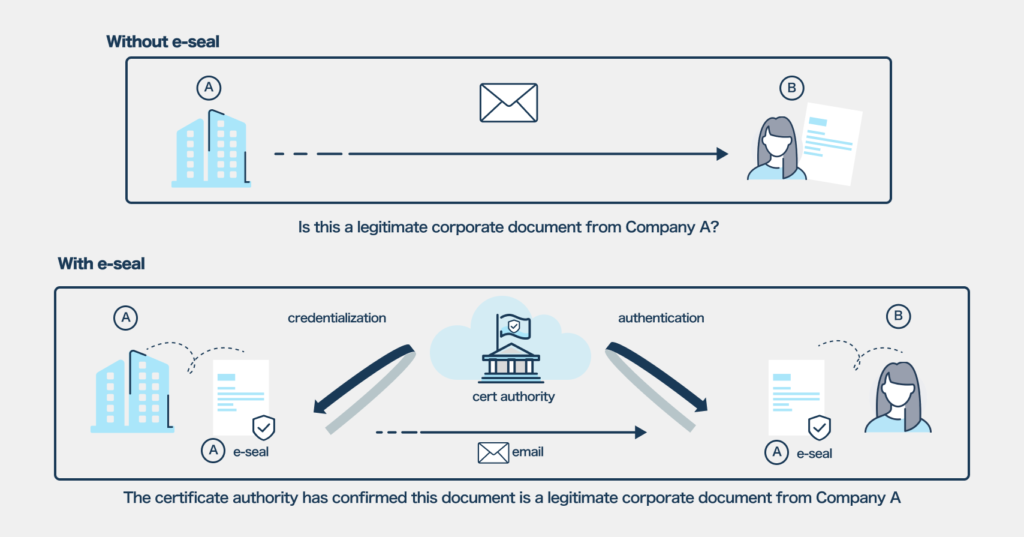release:
update:
A digital Hanko? e-Seal: The Next Wave of Digital Transformation in Japanese Business Culture

Table of contents
Introduction
Significant change is coming to the traditional way of doing business in Japan. Everyone in Japan, and many people overseas, are familiar with the Japanese hanko, or seal. Steeped in tradition, the use of seals in the country dates back to ancient times. Originally known as ‘inkan’ or ‘jitsuin’, these seals were mainly used for authentication of documents and as a means of identification, bearing a family crest or ‘kamon’. In modern Japan, the hanko and inkan are important business and government tools, used to formalize everything from agreements or plans in the workplace, through to formalizing real estate and other legal contracts.Since its establishment in 2021, the Japanese Digital Agency https://www.digital.go.jp/, has been working to transform many older and (some would say) outdated practices that require physical seals and hankos. The agency has recently proposed new regulations for electronic seals, known as “e-seal.” These regulations aim to modernize and standardize the use of electronic seals in the country, providing a legal framework similar to those operating in Europe for qualified e-signatures.
Electronic Signatures in Japan
Electronic signatures in Japan have been legal since 2000, under the Electronic Signature and Certification Business Act (電子署名及び認証業務に関する法律). This law provided the original legal framework for the use and recognition of electronic signatures, ensuring their validity and enforceability in legal and business transactions. Further laws (e.g., the Electronic Bookkeeping Preservation Act, Revision of 2021) provided additional enhancements, including third party validation via both time stamps and long term signatures.
What is an e-seal?*
Similar to e-signatures, an e-seal is a digital version of the old hanko or inkan, and given, through regulation and legislation, the same equal validity as their physical world counterparts. While individuals will have registered hankoes as well this article is focused on corporations.
Before we delve into the coming changes in e-seals, it will be helpful to understand how the current physical inkan and hankos operate, particularly the former, which has legal weight and standing for very important legal documents like real estate purchases, and company registrations. Because the inkan is a symbolic representation of a company, the seal needs to be registered with the government in order for it to be valid.
Typically, a business registers their seal with the Bureau of Legal Affairs office nearest to where they are headquartered. Once the seal is registered, it will become legally recognized and can be used for official documents, and the registrant will receive a seal registration card (inkan tourokushou), typically on the same day. For certain contracts, the counterparty may require a certificate of validity for the seal, confirming that it is registered and represents the company. This is called an inkan shomeisho.
Now this process has been long established for individuals and companies in Japan, and works well for documents that are signed in paper based forms. But in the on-line era, the limitations are obvious.
Enter the e-seal
As the Japanese government transforms existing practices to make them digitally relevant, the e-seal is a core part of this transformation.
As a key player in the Japan digital transformation solutions market, SignTime will be offering an e-seal solution in early 2025 to Japanese businesses. Further, SignTime is patent pending on specific physical integrations into an e-seal environment.
The new e-seal solution suite from SignTime takes a page from the physical world, and then transforms the rest of the processes securely in the cloud.
Advantages of E-Seals and Electronic Signatures in Japan
Advantages:
Speed: SignTime’s typical turnaround time for a completed electronic contract is approximately two hours.
Legal Recognition·Electronic signatures and seals are legally recognized under Japanese law, providing a robust legal foundation for electronic transactions.
Security: Documents are encrypted and it is possible to have third party confirmation of time/date of signature. e-seals take this one step further and can also provide third party verification of the signatories.
The Process
You will recall in the physical world, a seal registration card is issued by the Bureau of Legal Affairs for a corporation. Once a corporation verifies their identity with an inkan shomeisho, SignTime is able to create and store an original certificate with our partner CyberTrust. Collectively, organizations like CyberTrust are known as Qualified Trust Service Providers (QTSPs). SignTime partnered with CyberTrust to provide document timestamping and long term signatures, and is used for PAdES (PDF Advanced Electronic Signatures), “Long Term Certified Signatures”, time stamps and other third party certified products that require a “digital certification” element.

Conclusion
Because of the linkage between the SignTime platform and the CyberTrust verification and authentication systems, we are able to add e-seal records into the secure user account – thus allowing for the use of a binding legal e-seal as a part of that organization’s account.
With the incoming e-seal regulations, the SignTime platform will save an enormous amount of time for users, eliminating the need to apply a physical inkan or hanko stamp in order to make a contract “legal” or binding. If you or your organizations would like to know more about e-seals, e-signatures, or electronic contracts, get in touch!
*The e-seal regulations are not finalized so it is possible that there are some items that may change as finalization occurs.
